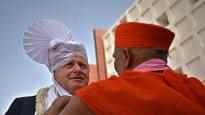In Britain, Johnson, spared by scandals, was not spared from problems in India either.
22.4. 20: 08 • Updated April 22. 20:08
The Prime Minister of the United Kingdom Boris Johnson has ended its two – day state visit to India.
During the visit, Johnson met with the Prime Minister Narendra Modinwhose pro-Russia line during the war in Ukraine has provoked criticism.
India, led by Mod, has not condemned Russia’s military action and has held Russian sides in the UN, among other places.
The background is India’s close relations with Russia, which, among other things, supplies India with more weapons than any other state.
Britain has also expressed concern that the technology it exports to India will end up in Russia’s arms, despite a ban on Western technology being exported to Russia.
Britain wants a giant trade deal with India
According to Britain, the primary reason for the state visit was to negotiate a new post-Brexit trade agreement between Britain and India.
India, with a population of 1.38 billion, is a huge potential market for British products and services, and the trade deal would be a major win for Johnson, who has been embroiled in scandals in his home country.
At present, Britain imports more from India than it exports, partly due to India’s import tariffs, which, for example, on passenger cars could rise to as much as 100 per cent of the value of a product.
Much to say is the fact that British exports were higher to small Belgium than it was to the world’s second most populous India.
However, India has made access to the British labor market a condition of the agreement.
Johnson has been cautiously positive about India’s demands, but under certain conditions.
Climbing on top of an excavator arouses criticism
Johnson is in the midst of a political storm in his home country after he held a party at the prime minister’s official residence while interest rate restrictions were still in place.
Johnson was not spared the scandals in India either.
While visiting the factories of the British tractor manufacturer JCB in the capital Delhi, Johnson climbed on top of an excavator to be photographed.
Johnson barely knew what kind of storm an innocent photograph could cause.
For example, the human rights organization Amnesty International criticized Johnson’s actions harshly.
